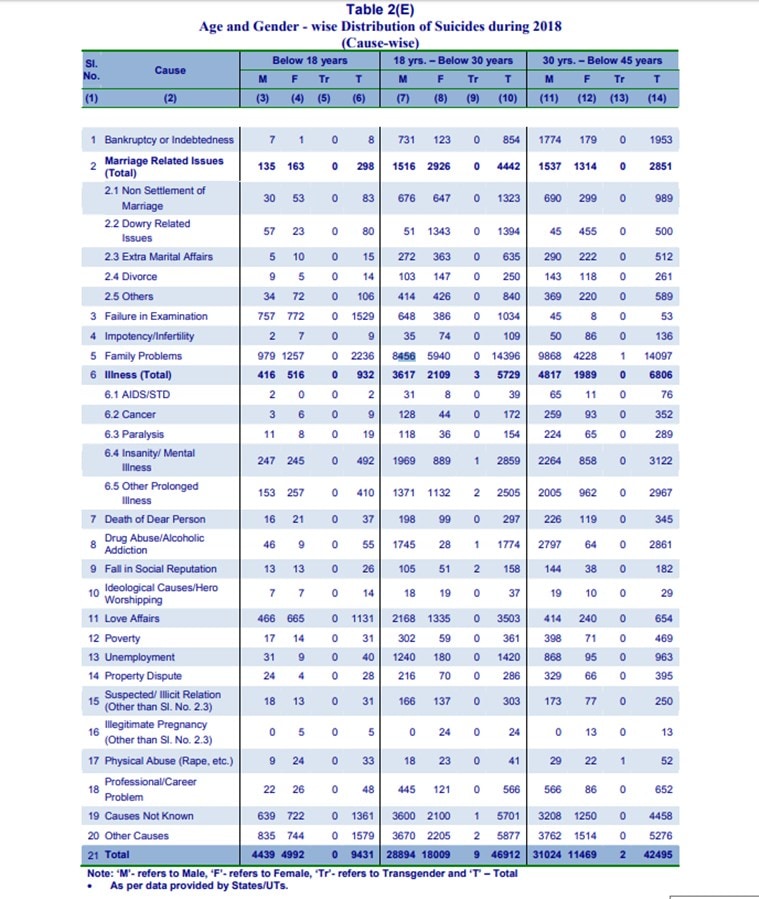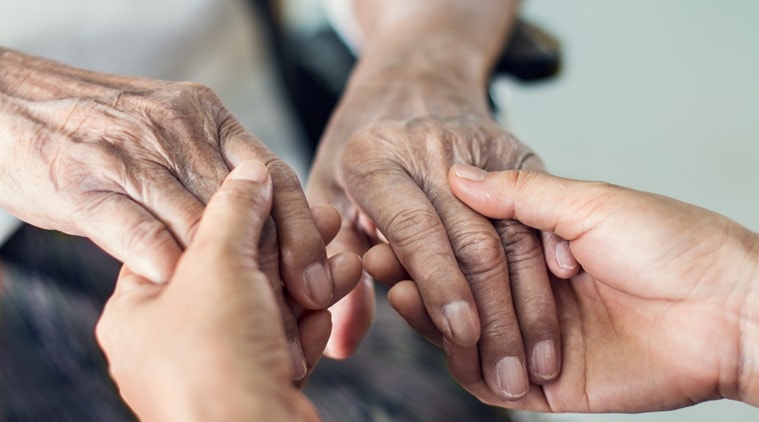Experts point out that lack of hope, help and self-worth leading to higher suicide rates. Over the alarming numbers, experts call for urgent attention to the burgeoning mental health crisis and the timely need to seek help.

Suicide is on an upswing in India with four metropolitan cities amongst 53 mega cities accounting for 36.1 per cent of the total suicides in 2018. As per a recent report released by the National Crime Records Bureau (NCRB), Delhi leads the pack with 2,369 suicides followed by Chennai 2,102, Bengaluru (2,082) and Mumbai (1,174) in 2018. In fact, as per the report, the suicide rate in cities (13.3) was higher as compared to the all-India suicide rate (10.2) with Delhi showing an increase of 8.2 per cent from 2,189 suicides in 2017 to 2,369 suicides in 2018.
As per the analysis, Delhi, which is the most-populous Union Territory (UT), also reported the highest number of suicides (2,526) among UTs, followed by Puducherry (500). Seven UTs together accounted for 2.6 per cent of total suicides in the country.
According to NCRB’s report, Delhi reported the highest number of suicides (2,526) among UTs. (ASDI report/Screengrab)’Family Problems’ (other than marriage related issues)’ was the major cause of suicides — 37.7 per cent or 8,069 — in 2018. The second cause for suicide, according to the Accidental Deaths And Suicides In India 2018 (ASDI) findings is ‘illness’ (17.7 per cent or 3,788). The total number of suicides reported in the country in 2018 stand at a high of 1,34,516 with the rate of suicides showing an increase by 0.3 during 2018 over 2017.
Not just these grave numbers, many studies including the 2018-The Global Burden of Disease Study published in The Lancet stated that India accounted for 37 per cent of global suicide deaths among women and 24 per cent among men in 2016.
Over the alarming numbers, experts call for urgent attention to the burgeoning mental health crisis and the timely need to seek help.

Why are the numbers going up? “Recent data from NCRB reflects the anomie our society is facing in dealing with this most sensitive part of human lives. Difficulty coping with adversities in the relationship (it could be break up, divorce, adultery/cheating, trust issues, unfulfilled or unsatisfied relationship, interpersonal conflicts etc) is making people think about suicide as last resort; due to lack of hope, help and self-worth identification in the emotional state of despair,” Dr Rahul Bagle, consultant physiatrist, Columbia Asia Hospital, Pune told indianexpress.com. Concurring psychiatrist Dr Anuneet Sabharwal said, “It is evident from the data that our relationships directly affect our physical, mental and spiritual well-being.”
Among the several reasons pointed out by experts, lack of communication, incongruent communication, lack of empathy, impulsivity and even technology are to be blamed. “Certain personality traits along with the upbringing styles that make people prone to develop low frustration tolerance, impulsivity, conformity/comparison, feeling entitled, emotionally fragile or unstable or dependant – are the major reasons that relationship issues are getting difficult to handle for people today,” asserted Dr Bagle.
Dr Sabharwal listed out some of the most common yet damaging factors behind failed relationships.
Trust and compatibility issues
Lack or loss of trust is one of the most harmful contagions to a couple’s long-term success. Trust issues may include factors such as jealousy, possessiveness, unreasonable rigidity, emotional infidelity, physical/sexual infidelity, relational game playing, lack of reliability and dependability and lack of emotional support.
Different expectations
A couple’s expectations in the relationship may differ as they begin to see their respective life plans as “what I want,” instead of “what we want”. Differences in expectations is an important factor behind broken relationships.
Communication issues

Numerous studies have identified communication as one of the top reasons for break-ups and divorces.
Money Issues
According to various research studies, differences over money is one of the top reasons for marital dissolution. Money issues and disputes tap into some of our deepest psychological needs and fears, including and not limited to trust, safety, security, power, control, and survival.
Where’s the gap?
According to the World Health Organization’s (WHO) 2019-report, India has the highest suicide rate in the South-East Asian region with one person still dying every 40 seconds from suicide with 16.5 suicides per 1,00,000 people.
Despite being a largely preventable public health problem, suicide continues to claim lives. What’s the way out? “People should start to count their mental health as much important aspect of health as the physical health,” pointed out Dr Bagle. He added, “Increasing the acceptability of consulting to mental health professional, is a sign of strength that you make for your own emotional betterment.” According to Dr Sabharwal, people who receive care and support from friends and family after going through a breakup or divorce are less likely to become suicidal or commit suicide.
While suicide prevention features in one of the Sustainable Development Goals (SDGs) to ensure healthy lives and promote well-being for all at all ages, people still don’t feel confident to seek professional help. According to Dr Bagle, making mental health first-aid accessible at all colleges, workplaces and other public places will definitely help in reducing the stigma and morbidity/mortality associated with suicide. He also went on to add that there is a need to introduce “evidence-based mental health-related lessons in school curriculum and college activities” that can sensitise the growing population from an early age about mental health.
According to Dr Sabharwal, it’s important to watch out for these suicidal signs and symptoms in a person
*Excessive sadness or moodiness: Long-lasting sadness, mood swings, and unexpected rage.
*Feeling a deep sense of hopelessness about the future, with little expectation that circumstances can improve.
*Sleep problems
*Choosing to be alone and avoiding friends or social activities also are possible symptoms of depression, a leading cause of suicide.
*Potentially dangerous behaviour, such as reckless driving, engaging in unsafe sex, and increased use of drugs and/or alcohol might indicate that the person no longer values his or her life.
*Recent trauma or life crisis: A major life crises might trigger a suicide attempt. Crises include the death of a loved one or pet, divorce or break-up of a relationship, loss of a job, or serious financial problems.
If you see someone who needs help, here’s how to reach out

*Don’t be afraid to ask if he or she is depressed or thinking about suicide.
*Ask if he or she is seeing a therapist or taking medications.
*Rather than trying to talk the person out of suicide, let him or her know that they have the ability to overcome this difficult phase of their life.
*In some cases, the person just needs to know that someone cares and is looking for the chance to talk about his or her feelings. You can then encourage the person to seek professional help.
? The Indian Express is now on Telegram. Click here to join our channel (@indianexpress) and stay updated with the latest headlines
For all the latest Lifestyle News, download Indian Express App.
Source: Read Full Article


